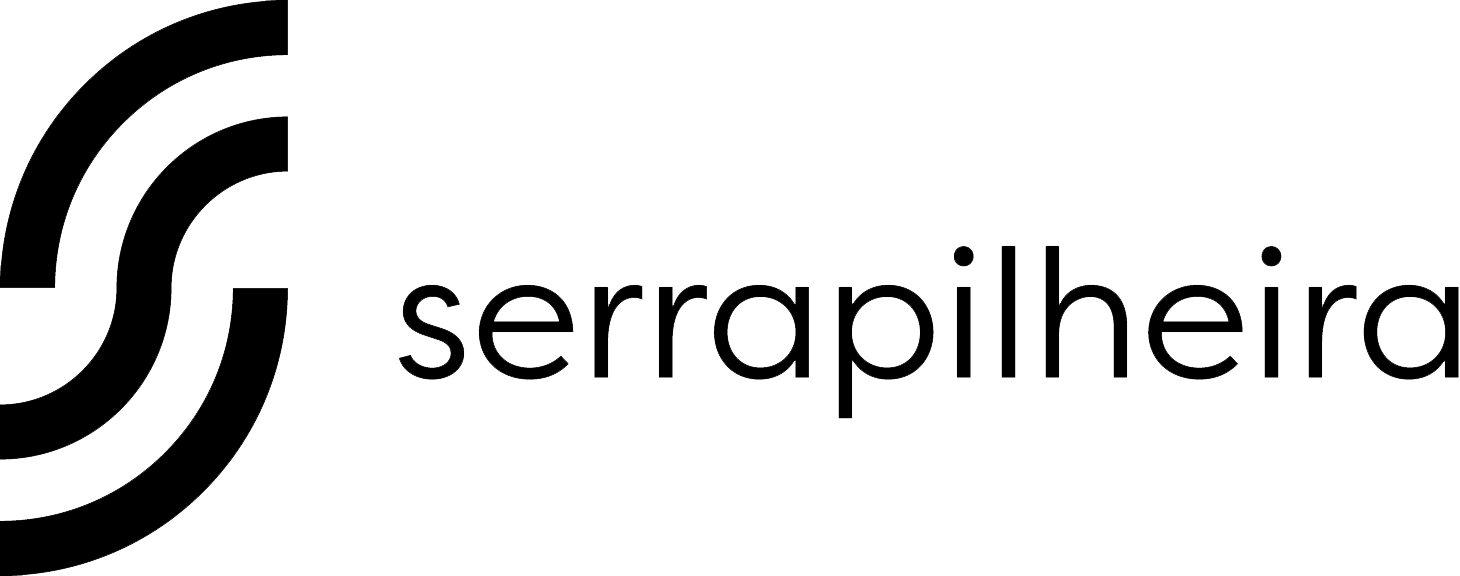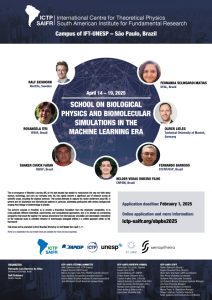School on Biological Physics and Biomolecular Simulations in the Machine Learning Era


April 14-19, 2025
ICTP-SAIFR, São Paulo, Brazil
Venue: ICTP-SAIFR/IFT-UNESP
Zoom ID: 875 9802 1926
Password: machine
Home
The re-emergence of Machine Learning (ML) in the last decade has started to revolutionize the way we think about science, technology, and even our everyday lives. ML has rapidly become a significant part of research across all scientific areas, including the physical sciences. This school attempts to capture the recent excitement about ML in general and for biophysical and biomolecular systems in particular, addressing participants with various backgrounds ranging from biology or biotechnology to physics.
The school’s purpose is threefold: a) to provide a theoretical foundation from the physicists’ perspective, b) to cross-pollinate different theoretical, experimental, and computational approaches, and c) to develop an overarching perspective that would tie together the various phenomena from biomolecular simulation and electrostatic interactions on the molecular scale to collective behavior of macroscopic biological entities in a unified approach within an ML framework.
There is no registration fee and limited funds are available for travel and local expenses.
This school will be preceded by the II Brazilian Workshop on Soft Matter from April 7-11.
- Fernando Luís Barroso da Silva (University of São Paulo, Brazil)
- Ralf Eichhorn (Nordita, Sweden)
List of Participants: Update on April 09, 2025.
Survey here
Announcement:
Application deadline: February 3, 2025 (closed)
Lecturers
Lecturers
- Fernanda Selingardi Matias (Universidade Federal de Alagoas, Brazil): Biological neural networks
- Atilio Tomazini (IFUSP, Brazil): CD and fluorescence and applications
- Luiz Fernando de Camargo Rodrigues (IFUSP, Brazil): SAXS (slides here)
- Oliver Lieleg (Technical University of Munich, Germany): Machine learning approaches for biomolecular and biophysical research
- Shaker Chuck Farah (IQUSP, Brazil): Proteins and nucleic acids: basic concepts and challenges?
- Fernando Barroso (FCFRP/USP, Brazil): Constant-pH simulation methods for biomolecular systems: the physics behind it
- Ralf Eichhorn (Nordita, Sweden): Introduction to Machine Learning
- Helder Veras Ribeiro Filho (CNPEM, Brazil): Machine Learning for Functional Protein Design
Registration
Program
Posters
Participants who are presenting a poster MUST BRING A PRINTED BANNER. The banner size should be at most 1 m (width) x 1,5 m (length). We do not accept A4 or A3 paper. The posters will be displayed during the entire event.
- Andrey Brito Nascimento (ICMC/UFSCAR/UEMASUL, Brazil): The time propagation in multilayer Erdos-Renyi Network
- Isabela Brunozi de Oliveira (Unesp, Brazil): Dynamics of the encounter complex between M2-1 globular domain and the hRSV Phosphoprotein
- Tatiana Cabrera (Escuela Politécnica Nacional, Ecuador): Enhancing PMF Calculations through Cluster Analysis as a Complement to Umbrella Sampling
- Marilina Cathcarth (Institute of Theoretical and Applied Physicochemical Research INIFTA-UNLP-CONICET, Argentina): Molecular Theory of protein adsorption on silica surfaces
- Raquel Checca (Centro Brasileiro de Pesquisas Físicas, Brazil): Insights into CaCO3 crystallization processes using cryogenic transmission electron microscopy and In-Situ Synchrotron Radiation X-ray Diffraction techniques
- Kevin Johan Cobos Montes (Universidad Andres Bello, Chile): Understanding the Molecular Mechanisms of Amyloid-Beta Peptide Aggregation Inhibition
- Pamella da Silva (Universidade Estadual de Campinas, Brazil): Simulations of Plasmodium falciparum proteins in biocompatible ionic liquids
- Fausta Desantis (Istituto Italiano di Tecnologia, Italy): In silico exploration of misfolding and dimerization in an aggregation-prone light chain in AL amyloidosis
- Raphael Dias (Sao Paulo State University (UNESP) – IBILCE, Brazil): “Exploring the Conformational Transitions of the M2-1 Protein between Closed and Open States of hRSV and hMPV Viruses”
- Rodrigo Alves Dias (UFJF, Brazil): The walking cell. A computer simulation study for metastasis cells.
- Victor Lucas Bernardes França (Universidade Federal do Ceará, Brazil): Shedding light on cancer immunology at the molecular level: A quantum biochemistry study of representative PD-1/PD-L1 conformations
- Vanessa Amorim Gonçalves (Universidade Federal do Ceará, Brazil): Mol-plastic
- Ilyas Philippe Abdelkader Jacques Grandguillaume (Universidade de Sao Paulo, Brazil): Machine learning driven score function for antibody antigen prediction
- Madson Allan Luna Aragão (Federal University of Minas Gerais, Interunit Postgraduate Program in Bioinformatics, Brazil): A Computational Workflow for Antimicrobial Peptide Prediction Using Machine Learning and Physicochemical Features
- Claudia Alejandra Martinez Garcia (Universidad de Concepción, Chile): Identification of Druggable Binding Sites and Small Molecules as Modulators of TMC1
- Danilo Kiyoshi Matsubara (Institute of Chemistry – University of São Paulo, Brazil): Computational Design of Cholesterol-Lowering Miniproteins: Targeting PCSK9 to Enhance LDL Receptor Recycling
- Willy Willcov Kevin Menacho Nacho (Institute of Materials Science of Barcelona (ICMAB-CSIC), Bolivia): Electrostatic interactions of RNA and protein-like substrates with the nonlinear Poisson-Boltzmann equation.
- Javier Antonio MONTOYA MARTINEZ (Universidad de Cartagena, Colombia): Design of peptides with interfacial activity assisted by machine learning and classical molecular dynamics simulations
- Paul Muka (University of Sao Paulo, Brazil): Monte Carlo Simulation of preclinical PET system
- Renan Pereira Pedro (Universidade Estadual Paulista “Júlio de Mesquita Filho” – Instituto de Biociências, Letras e Ciências Exatas (UNESPqIBILCE), Brazil): CHALCONE DERIVATIVES AS POTENTIATORS OF MONOCLONAL ANTIBODIES TARGETING THE F PROTEIN OF HUMAN RESPIRATORY SYNCYTIAL VIRUS (HRSV)
- Carlos Alejandro Peña (Universidad de Concepción, Chile): Interleukin (IL-8) molecular dynamic simulations shows antimicrobial activity as membrane pore forming peptides
- Ander Francisco Pereira (UNICAMP, Brazil): Effects of cosolvents on the folding and function of riboswitches
- Daniella Lúmara Pereira Mendes de Oliveira Peres (University of São Paulo USP, Brazil): Classification of oral cancer using Random Forest: diagnosis by machine learning
- Vinicius Piccoli (Institute of Chemistry – CCES – UNICAMP, Brazil): Exploring Ibuprofen Solvation in Bio-Compatible Deep Eutectic Solvents: Insights from Polarizable Force Fields and Kirkwood-Buff Theory
- Éderson Sales Moreira Pinto (Universidade Federal do Rio Grande do Sul, Brazil): Characterizing the Biophysical Effects of Mutations on the XPF-ERCC1 Complex
- Samuel Utrabo Pizzol (Institute of Physics, University of São Paulo, Brazil): Lipid membrane structure by small angle X-ray scattering (SAXS): chemical group scattering density profiles.
- PATRICIA ARACELI QUISPE CASTILLO (Centro de Química Inorgánica Dr. Pedro J. Aymonino, Argentina): CLASSIFICATION OF LIGAND-RECEPTOR BINDING MODES BASED ON MOLECULAR DYNAMICS TRAJECTORIES AND MM/GBSA ENERGIES.
- Yago Emanoel Ramos Silva (Federal University of Bahia, Brazil): Handedness and Brain Lateralization: A Non-Linear Approach
- Leandro Gutierrez Rizzi (Universidade Federal de Viçosa (UFV), Brazil, Brazil): Nonparametric determination of the committor in multimolecular systems
- Vinícius Rodrigues Soares (UFF – Biology Student, Brazil): Network pharmacology approach to understand the potential of Icariin ageinst Diabetic retinopathy and age-related macular degeneration
- Josué Rodríguez Hernández (Faculta de Ciencias Físico Matemáticas – BUAP, Mexico): Feature Extraction in Medical Image Classification Using a Convolutional Neural Network-Based Filter
- Murilo Nogueira Sanches (UNESP, Brazil): The different pathways of amyloid-beta aggregation
- Pedro Fellype Almeida Silva (Universidade Federal de Alagoas, Brazil): Applying information theory quantifiers to analyze motor cortex activity of a non-human primate during an instructed delayed reach-to-grasp task
- Enrique Solórzano (Yachay Tech University, Ecuador): Current status of microRNA family 548
- Matheus Stefanini Mariano (São Carlos Institute of Physics – University of São Paulo, Brazil): Evolutionary Game-Theoretic Approach to the Population Dynamics of Early Replicators
- Gisele Strieder Philippsen (Universidade Federal do Paraná, Brazil): Study of S. aureus PlsY inhibition by compounds of C. citratus essential oil
- Arthur Tonietto Mangini (Universidade Federal do Rio Grande do Sil, Brazil): A Kaistella jeonii esterase conformational dynamics binding with poly(ethylene terephthalate) study
- Paulina Victoria Valenzuela-Hormazabal (Universidad De Concepción, Chile): Computational Strategy for the Identification of Multitarget Compounds: Applications in Alzheimer’s Disease.
- Rafaela Molina de Angelo (UFABC, Brazil): Search for Natural Products Against Schistosomiasis Using Machine Learning Models
- Antonio Joao Fidelis (IFC, Brazil):Power-law behavior around bifurcation points of 1D maps: A supertracks approach
Abstracts HERE.
Short Talks (Friday)
- RODRIGO ALVES DIAS: The walking cell. A computer simulation study for metastasis cells
- Fausta Desantis: In silico exploration of misfolding and dimerization in an aggregation-prone light chain in AL amyloidosis
- Éderson Sales Moreira Pinto: Characterizing the Biophysical Effects of Mutations on the XPF-ERCC1 Complex
Abstracts HERE.
Videos and Files
-
10:00 - Shaker Chuck Farah (IQUSP, Brazil):
Proteins and nucleic acids: basic concepts and challenges? - Class 1
-
11:30 - Atilio Tomazini Junior (IFUSP, Brazil):
CD and fluorescence and applications - Class 1
-
14:30 - Shaker Chuck Farah (IQUSP, Brazil):
Proteins and nucleic acids: basic concepts and challenges? - Class 2
-
16:00 - Shaker Chuck Farah (IQUSP, Brazil):
Proteins and nucleic acids: basic concepts and challenges? - Class 3
-
10:00 - Atilio Tomazini Junior (IFUSP, Brazil):
CD and fluorescence and applications - Class 2
-
11:30 - Luiz Fernando de Camargo Rodrigues (IFUSP, Brazil):
SAXS
-
14:30 - Ralf Eichhorn (Nordita, Sweden):
Introduction to Machine Learning - Class 1
-
16:00 - Ralf Eichhorn (Nordita, Sweden):
Introduction to Machine Learning - Class 2
-
10:00 - Oliver Lieleg (Technical University of Munich, Germany):
Machine learning approaches for biomolecular and biophysical research - Class 1
-
11:00 - Ralf Eichhorn (Nordita, Sweden):
Introduction to Machine Learning - Class 3
- 14:00 - Prof. Dr. Oliver Lieleg (Technical University of Munich, School of Engineering and Design, Department of Materials Engineering): Combining biopolymers with DNA nanotechnology for applications in drug delivery
-
15:30 - Fernanda Selingardi Matias (Universidade Federal de Alagoas, Brazil):
Biological neural networks - Class 1
-
17:00 - Fernanda Selingardi Matias (Universidade Federal de Alagoas, Brazil):
Biological neural networks - Class 2
-
10:00 - Oliver Lieleg (Technical University of Munich, Germany):
Machine learning approaches for biomolecular and biophysical research - Class 2
-
11:30 - Fernanda Selingardi Matias (Universidade Federal de Alagoas, Brazil):
Biological neural networks - Class 3
-
14:30 - Helder Ribeiro (CNPEM/Campinas):
Machine Learning for Functional Protein Design - Class 1
-
16:00 - Helder Ribeiro (CNPEM/Campinas):
Machine Learning for Functional Protein Design - Class 2
-
10:00 - Fernando Barroso (FCFRP/USP, Brazil):
Constant-pH Methods in Biomolecular Simulations: Integrating Physics, Machine Learning, and Applications - Class 1
-
11:30 - Fernando Barroso (FCFRP/USP, Brazil):
Constant-pH Methods in Biomolecular Simulations: Integrating Physics, Machine Learning, and Applications - Class 2
-
16:00 - Ilyas Grandguillaume (Catherine Etchebest):
Machine learning enhanced scoring for improved antibody-antigen (AbAg) docking prediction
-
16:15 - Arthur Tonietto Mangini (UFRGS):
A Kaistella jeonii esterase conformational dynamics binding with poly (ethylene terephthalate) study
-
16:30 - Fausta Desantis (Instituto Italiano di Tecnologia):
In silico exploration of misfolding and dimerization in an aggregation-prone light chain in AL amyloidosis
-
16:45 - RODRIGO ALVES DIAS (UFRJ):
The walking cell. A computer simulation study for metastasis cells
-
10:00 - Oliver Lieleg (Technical University of Munich, Germany):
Machine learning approaches for biomolecular and biophysical research - Class 3
-
11:30 - Fernando Barroso (FCFRP/USP, Brazil):
Constant-pH Methods in Biomolecular Simulations: Integrating Physics, Machine Learning, and Applications - Class 3
asdasdasd
Photos
Additional Information
Attention! Some participants in ICTP-SAIFR activities have received email from fake travel agencies asking for credit card information. All communication with participants will be made by ICTP-SAIFR staff using an e-mail “@ictp-saifr.org”. We will not send any mailings about accommodation that require a credit card number or any sort of deposit. Also, if you are staying at Hotel Intercity the Universe Paulista, please confirm with the Uber/Taxi driver that the hotel is located at Rua Pamplona 83 in Bela Vista (and not in Jardim Etelvina).
BOARDING PASS: All participants, whose travel has been provided or will be reimbursed by ICTP-SAIFR, should bring the boarding pass upon registration. The return boarding pass (PDF, if online check-in, scan or picture, if physical) should be sent to secretary@ictp-saifr.org by e-mail.
COVID-19: Brazilians and foreigners no longer have to present proof of vaccination before entering the country.
Visa information: Nationals from several countries in Latin America and Europe are exempt from tourist visa. Nationals from Australia, Canada and USA will be required to obtain a tourist e-visa for visits after April 10, 2025.
Accommodation: Participants, whose accommodation will be provided by the institute, will stay at Hotel Intercity the Universe Paulista. Hotel recommendations are available here.
Poster presentation: Participants who are presenting a poster MUST BRING A PRINTED BANNER . The banner size should be at most 1 m (width) x 1,5 m (length). We do not accept A4 or A3 paper.

